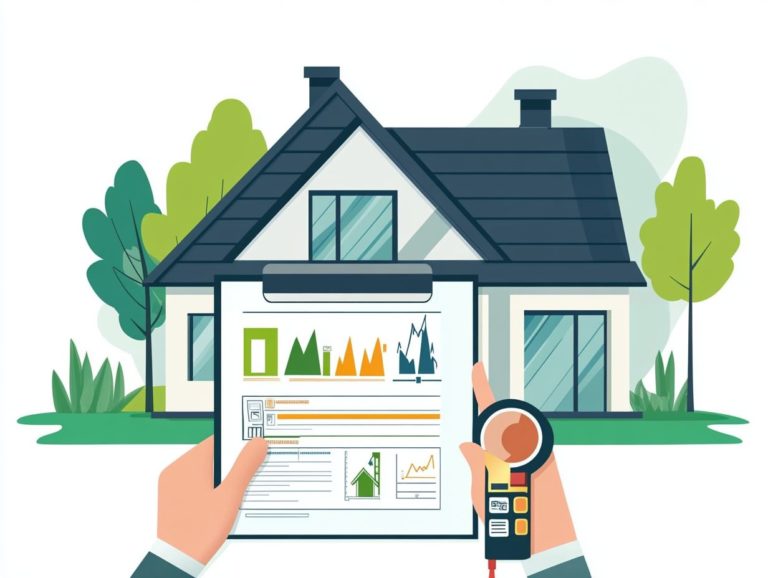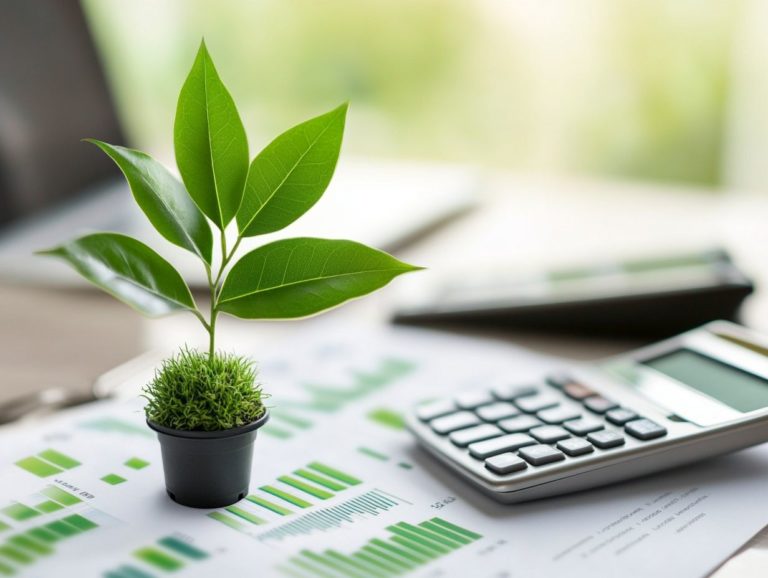5 Energy Audit Resources for Homeowners
Are you aiming to boost your home’s energy efficiency but feeling a bit lost on how to begin? An energy audit could be just the answer you ve been searching for.
This article delves into five invaluable resources at your fingertips: the Department of Energy, local utility companies, energy auditors, online tools, and the Home Energy Score.
You ll discover what an energy audit entails, its significance, and how it can truly benefit you. Additionally, you ll gain insights into crucial assessment areas, preparation tips, costs, and common recommendations.
Dive in and unlock the secrets to enhancing your home’s efficiency!
Contents
- Key Takeaways:
- 1. Department of Energy
- 2. Local Utility Companies
- 3. Energy Auditors
- 4. Online Energy Audit Tools
- 5. Home Energy Score
- What Is an Energy Audit and Why Is It Important?
- Frequently Asked Questions
- What is an energy audit and why is it important for homeowners?
- What are the top 5 energy audit resources for homeowners?
- How can a homeowner prepare for an energy audit?
- What are the common recommendations given by energy auditors?
- How much does an energy audit typically cost for homeowners?
- Can homeowners see a significant decrease in their energy bills after an energy audit?
Key Takeaways:

The Department of Energy offers information and resources on energy audits, including 5 essential energy audit tools, making it a great starting point for homeowners.
Local utility companies often provide free or discounted energy audits, making it a cost-effective option for homeowners.
Online energy audit tools provide a quick and convenient way for homeowners to assess their energy usage and prepare for an energy audit to identify potential areas for improvement.
1. Department of Energy
The Department of Energy (DOE) plays a crucial role in championing energy efficiency and sustainability throughout the nation. It offers a wealth of resources and programs designed to help you reduce energy consumption and lower your energy bills, including the EmPower+ program. This initiative aligns seamlessly with the Inflation Reduction Act, providing valuable assistance for energy-saving upgrades and technologies.
Beyond the EmPower+ program, the DOE supports a range of initiatives aimed at enhancing energy efficiency measures. For instance, local solar projects are designed to grant equitable access to renewable energy, benefiting diverse neighborhoods. These initiatives empower your community by significantly reducing reliance on fossil fuels while also cutting down on monthly energy costs.
The DOE underscores the significance of home energy assessments and audits, which are essential for finding problems and recommending necessary upgrades. By equipping you with personalized resources and actionable insights, the DOE not only promotes healthier living environments but also contributes to the broader national goal of achieving a sustainable, energy-efficient future.
2. Local Utility Companies
Local utility companies play a crucial role in enhancing energy efficiency by offering services like energy audits, which help you uncover effective energy-saving strategies. This not only leads to lower energy bills but also encourages more sustainable practices.
By collaborating with homeowners, these companies streamline the energy audit process and provide valuable resources, including comprehensive energy audit checklists. This gives you the power to take an active role in assessing your home and pinpointing areas that need improvement, following 5 tips for energy audit success.
Local utilities often offer a range of incentives, such as rebates or financing options, for those who opt for energy-efficient upgrades. By fostering these partnerships, they enable you to reduce your carbon footprint while enjoying significant energy savings, contributing to a healthier planet and long-term economic benefits.
3. Energy Auditors
Energy auditors are your go-to professionals for conducting thorough assessments of your home’s energy efficiency. They provide you with invaluable insights through a detailed home energy report that identifies areas like air leakage and insulation levels, revealing where improvement is needed.
Armed with a blend of technical training and practical know-how, these specialists hold relevant certifications that enable them to evaluate your residence with precision. They use advanced tools, such as infrared cameras, to visualize temperature variations that may signal insulation deficiencies. Blower door tests measure how airtight your home is and find leaks with remarkable accuracy.
The significance of their recommendations is immense, guiding you to make informed decisions about energy-saving upgrades, especially concerning HVAC systems and insulation. This means you can enjoy greater comfort in your home while reducing utility costs an outcome every homeowner can appreciate.
Start your energy audit today for a more efficient home!
4. Online Energy Audit Tools

Online energy audit tools empower you to take control of your home’s efficiency. With a straightforward DIY audit, you can assess your energy use, identify savings, and explore energy audits: tools for home improvement to see the benefits of energy-efficient upgrades.
These intuitive platforms typically guide you through a step-by-step process, prompting you to enter details about your home s layout, appliances, and energy bills. As you progress, you’ll visualize your consumption patterns and uncover tailored recommendations for improvements.
Understanding your energy patterns helps you prioritize efficiency upgrades. Use this knowledge to make quick, impactful changes that lead to significant cost savings while promoting environmental sustainability.
5. Home Energy Score
The Home Energy Score is a useful tool that provides a clear score showing your home’s energy use. This score serves as a valuable guide, helping you pinpoint opportunities for energy-efficient upgrades and enhancements to your HVAC systems.
This thorough evaluation considers various factors, including insulation levels, window efficiency, heating and cooling systems, and overall energy consumption patterns. By grasping the nuances of your score, you can prioritize energy-saving measures whether it s sealing gaps for improved insulation or upgrading to more efficient appliances.
An energy-efficient home not only slashes your utility bills but also elevates your comfort, enhances indoor air quality, and contributes to environmental sustainability. Invest in these energy upgrades today to unlock long-term savings and boost your home’s value!
Start your energy efficiency journey now and see the difference it makes!
What Is an Energy Audit and Why Is It Important?
An energy audit serves as a comprehensive evaluation of your home’s energy consumption, meticulously designed to pinpoint inefficiencies and recommend energy-saving upgrades. For homeowners looking to enhance this process, utilizing the 5 essential tools for energy auditors is crucial for reducing energy costs while minimizing their environmental footprint through informed energy efficiency assessments.
You can conduct a DIY energy audit or enlist a professional for a more thorough evaluation of your energy usage, especially if you’re looking for energy audit insights for new home buyers.
A DIY approach typically involves utilizing online checklists and basic tools to:
- Identify drafts
- Assess insulation levels
- Evaluate the efficiency of your appliances
However, a professional audit offers a more detailed analysis, employing advanced techniques like blower door tests (which check for air leaks) and infrared imaging (which reveals hidden insulation issues).
Understanding your energy usage patterns is crucial as it can reveal specific areas ripe for improvement, potentially leading to significant savings on your utility bills. By implementing the recommended changes, you enhance your comfort and contribute to sustainable living.
How Can Homeowners Benefit from an Energy Audit?
You can reap significant benefits from an energy audit, uncovering valuable insights into energy-saving strategies that reduce your energy bills and pave the way for implementing energy-efficient technologies throughout your home.
This process doesn t just translate to meaningful cost savings on your monthly utility bills; it also enhances your overall comfort by optimizing your heating and cooling systems.
For instance, upgrading to LED lighting, installing programmable thermostats, or sealing air leaks can dramatically boost your home’s energy efficiency. These smart investments can even increase your property value, making it more attractive to potential buyers who prioritize sustainability.
You’ll often discover that simple changes like adding insulation or swapping out old appliances for Energy Star-rated models can yield substantial benefits, ultimately transforming your living environment into a more efficient and enjoyable space.
What Are the Key Areas Assessed in an Energy Audit?

An energy audit typically assesses essential areas like the building envelope, HVAC system (Heating, Ventilation, and Air Conditioning), insulation levels, and air leakage. This process offers a thorough overview of your home s energy performance while pinpointing opportunities for improvement.
This assessment is vital. It helps you grasp where energy loss occurs and how to boost efficiency.
The building envelope, which includes your walls, roofs, and windows, serves as a protective barrier against the elements. Ensuring it s well-sealed can significantly reduce air leaks and lead to impressive energy savings.
Your HVAC system needs to operate at peak efficiency. Regular maintenance and timely upgrades are essential to achieve this.
Don t overlook insulation levels; they should be carefully examined to meet current standards. Inadequate insulation can send your energy bills soaring.
Professionals often utilize methods like blower door tests to gauge a building’s airtightness and thermal imaging to visually identify heat loss. These techniques provide invaluable insights for optimizing your energy use.
How Can Homeowners Prepare for an Energy Audit?
You can effectively prepare for an energy audit by following a well-structured energy audit checklist. Review your HVAC systems, appliances, and existing insulation to ensure a thorough evaluation that leads to accurate recommendations.
Gather your recent utility bills. This will help you identify consumption patterns and pinpoint potential areas for improvement.
Ensure that the auditor has easy access to critical spaces like attics, basements, and crawl spaces. This will facilitate a comprehensive inspection.
Take time to reflect on your personal energy usage habits. Consider peak usage times and frequently used devices; this allows you to pose targeted questions during the audit.
By engaging in these preparations, you can maximize the benefits of the audit process. Schedule your energy audit today to enhance your home’s energy efficiency!
What Are the Costs Associated with an Energy Audit?
The costs associated with an energy audit can vary considerably. You might find free or low-cost DIY options alongside more comprehensive professional audits, which might carry higher fees but can lead to significant long-term energy savings.
Typically, you can expect to pay between $100 and $500 for a basic professional audit, depending on your home’s size and the complexity of the assessment.
Many local utilities and government programs offer rebates or incentives. This can make that initial investment feel much more manageable.
These financial benefits often translate into reduced energy bills once you implement the audit recommendations. You could potentially save hundreds each year!
Ultimately, viewing an energy audit as an investment rather than just an expense can unlock substantial savings over time. Making those upfront costs well worth it.
What Are the Common Recommendations from an Energy Audit?
Common recommendations arising from an energy audit typically include energy-saving upgrades that can significantly enhance your overall energy efficiency.
You might consider improving insulation, installing weatherstripping, and addressing any inefficiencies in your HVAC system.
The audit may suggest implementing programmable thermostats. These allow for better temperature control, helping you reduce unnecessary energy consumption when spaces are unoccupied.
Auditors may also recommend switching to LED lighting. This not only consumes less electricity but also has a longer lifespan compared to traditional bulbs.
If you’re contemplating larger-scale investments, upgrades such as solar panel installations or advanced energy management systems can substantially lower your utility costs over time. These options can save you money and make your home more energy-efficient!
Each of these suggestions not only paves the way toward a more sustainable environment but also offers tangible savings on your energy bills. Act on these recommendations today!
Frequently Asked Questions

What is an energy audit and why is it important for homeowners?
An energy audit assesses a home’s energy usage and efficiency. It’s crucial for homeowners as it identifies energy waste and offers solutions to enhance efficiency, ultimately saving money on energy bills. For more insights, check out 5 key considerations for energy audits.
What are the top 5 energy audit resources for homeowners?
Don t wait! Take advantage of these resources now to start saving on your energy bills:
- Local utility company: Many utilities offer free or discounted energy audits to their customers.
- Energy Star: This program provides a comprehensive home energy audit tool and resources to boost energy efficiency.
- Department of Energy (DOE): The DOE website offers DIY energy audit information and resources for finding professional auditors.
- Non-profit organizations: Organizations like the Energy Trust of Oregon provide free or low-cost energy audits for homeowners.
- Professional energy auditors: Hiring a professional can yield a thorough assessment of your home’s energy usage and efficiency.
How can a homeowner prepare for an energy audit?
To prepare for an energy audit, homeowners can:
- Gather information: Collect energy bills from the past year to share with the auditor.
- Perform a DIY audit: Conduct a simple DIY audit to spot any obvious energy efficiency issues.
- Make a list of concerns: Write down specific areas or questions for the auditor to address.
- Ensure access to all areas: Provide access to all parts of the home, including attics, crawl spaces, and heating, ventilation, and air conditioning (HVAC) systems.
What are the common recommendations given by energy auditors?
Common recommendations from energy auditors may include:
- Upgrading to energy-efficient appliances and light bulbs.
- Improving insulation and sealing air leaks.
- Upgrading to a programmable thermostat.
- Conducting regular maintenance on HVAC systems.
- Switching to renewable energy sources like solar panels.
How much does an energy audit typically cost for homeowners?
Wondering how much an energy audit will cost? It varies depending on type, home size, and location. On average, a professional energy audit costs between $200 and $500. Some utility companies and non-profit organizations may even offer free or discounted audits.
Can homeowners see a significant decrease in their energy bills after an energy audit?
Yes, homeowners can achieve a notable reduction in their energy bills after applying recommendations from an energy audit. Depending on the home and changes made, savings can range from 5% to 30%. Improving energy efficiency can also enhance the home’s value.






